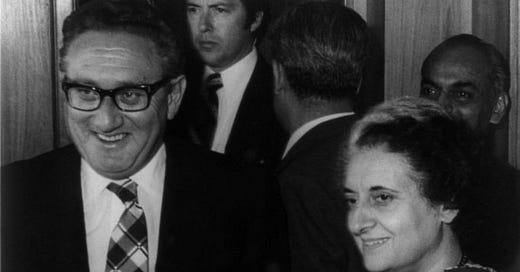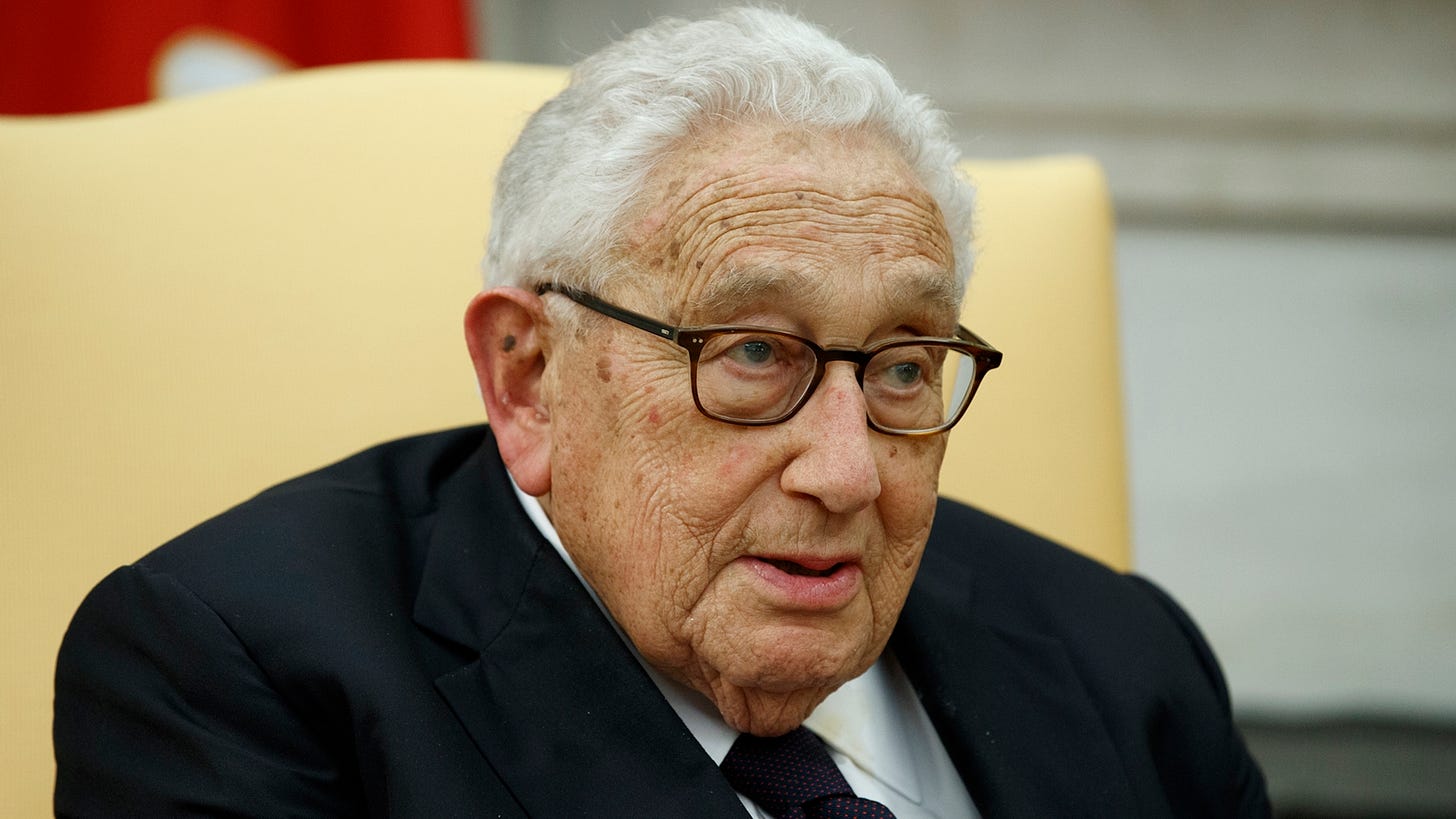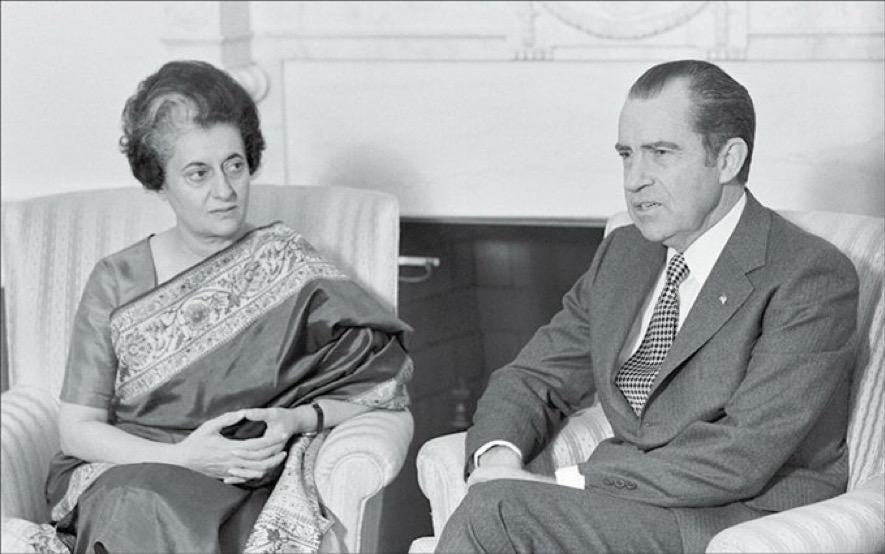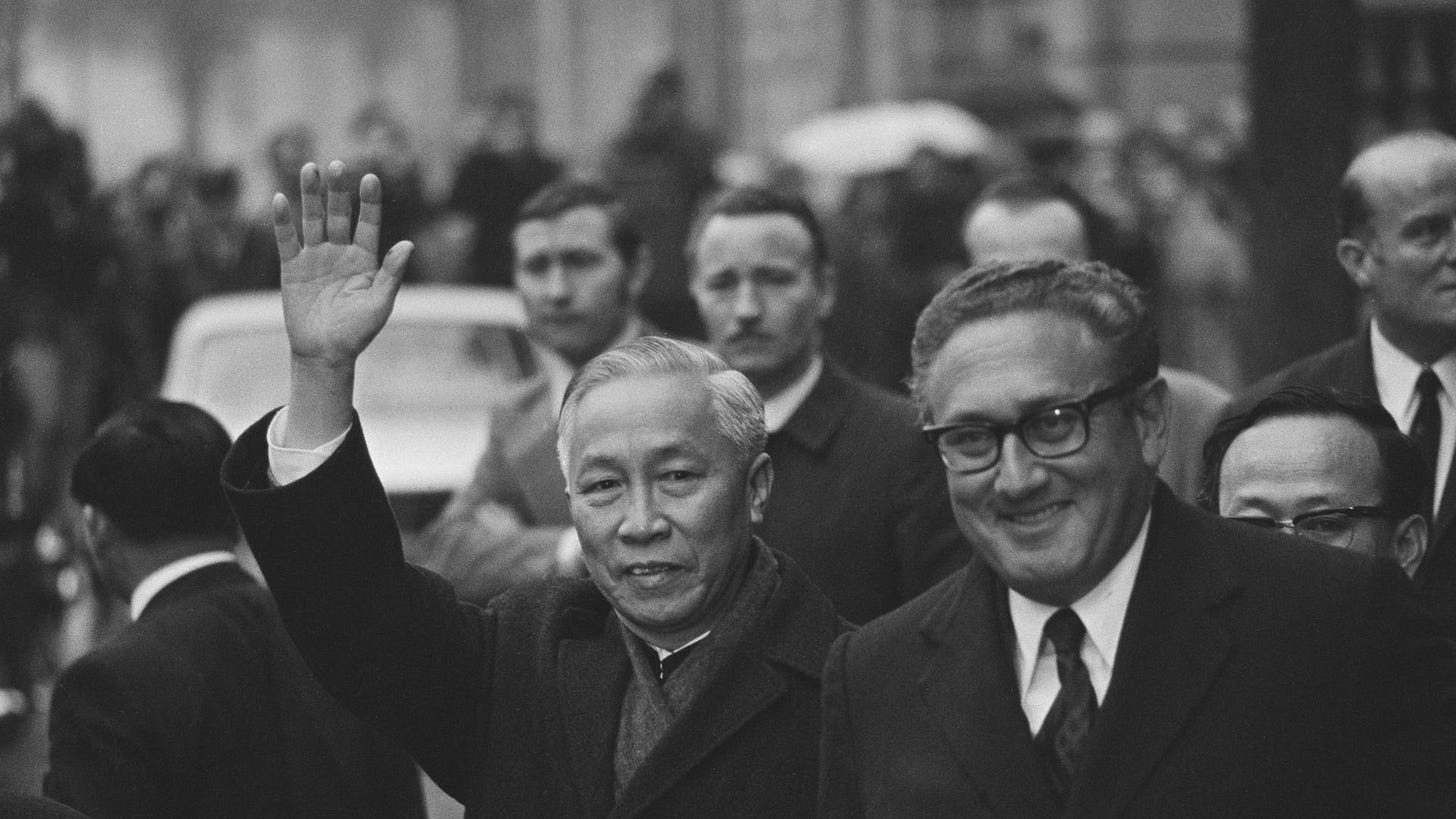Henry Kissinger, Bismarck of Cold War Era, dies at 100: An Indian Perspective
Henry Kissinger— a centenarian, former secretary of state and icon of American power, globally— influenced U.S. foreign policy for decades. Did he call Indira Gandhi a 'b**ch', Indians 'b***ards'?
Henry Kissinger: The Architect of Modern Realpolitik
Early Struggles and the Path from Hitler’s Germany to USA
The life of Henry Kissinger, who passed away today at the age of 100 in his Connecticut home, stands as a testament to extraordinary resilience and unyielding determination. Born as Heinz Alfred Kissinger in Germany in 1923, his formative years were dramatically altered by the ominous approach of World War II. In 1938, amid the rising tide of Hitler's regime, his Jewish family took the decisive step to flee to New York City, seeking refuge and a fresh start. This pivotal migration deeply influenced Kissinger's early worldview and later played a significant role in shaping his unique approach to foreign policy. This journey from a turbulent beginning to becoming a seminal figure in global diplomacy encapsulates a remarkable story of perseverance and adaptability.
The Formative Years of Henry Kissinger
In his initial years in the United States, Henry Kissinger's life was a remarkable blend of determination, balancing his educational pursuits with work, as detailed in Walter Isaacson's "Kissinger: A Biography." Following high school, he took up employment at a shaving brush factory while also attending night classes, subsequently enrolling in the City College of New York with an initial focus on accounting. However, his trajectory shifted significantly when he was drafted into the U.S. Army in 1943 at the age of 19.
As a newly naturalized U.S. citizen, Kissinger served as a German language interpreter. His role was crucial in the arrest of Gestapo members and the liberation of concentration camp prisoners, experiences that left a lasting impression on him. For his service, he was awarded the Bronze Star. Following his military tenure, Kissinger embarked on an eminent academic path at Harvard, producing a groundbreaking senior thesis and eventually becoming a distinguished faculty member and consultant for the government. This phase of his life laid the groundwork for his profound future impact on U.S. foreign policy.
Ascent to Power Clique: The Nixon and Ford Years
Henry Kissinger's ascent to the role of National Security Adviser in 1968 marked the beginning of his significant influence in shaping U.S. foreign policy, a role that was further magnified when he became Secretary of State under Presidents Richard Nixon and Gerald Ford. His approach, deeply ingrained in the concept of 'realpolitik', was pivotal in addressing several key global events during this period. Notably, in 1973, Kissinger's "Shuttle Diplomacy" was crucial in mitigating the Arab-Israeli War. His strategic foresight also played a central role in the landmark re-establishment of diplomatic relations between the USA and China in 1972, significantly altering the course of the Cold War. Additionally, his involvement in the Vietnam War, culminating in the Paris Peace Accords of 1973, demonstrated his capability in negotiating complex international conflicts. Furthermore, his dialogue with Soviet leader Leonid Brezhnev, leading to the Strategic Arms Limitation Talks (SALT) in the early 1970s, underscored his dedication to curbing nuclear arms proliferation. These efforts across various years and geopolitical landscapes highlight Kissinger's adeptness in international diplomacy and his enduring legacy in shaping global affairs.
Indira Gandhi in Nixon's White House: November, 1971
November 1971, with the looming Indo-Pak War, marked a pivotal moment in Indo-US relations, highlighted by a critical exchange between Indian Prime Minister Indira Gandhi and US President Richard Nixon. In a tense White House meeting, their dialogue encapsulated the period's strained diplomatic ties.
President Nixon, known for his forthrightness, issued a stark warning: “If India pokes its nose in Pakistan, the US will not keep its trap shut. India will be taught a lesson.” This blunt statement mirrored the US Administration's stance on the intensifying South Asian tensions. However, Prime Minister Gandhi, renowned for her resolute spirit, met Nixon's gaze and responded with equal determination, “India regards America as a friend, not a boss. India is capable of writing its own destiny. We know and are aware how to deal with each one according to circumstances.”
As Henry Kissinger recounted in his autobiography, this interaction underscored the challenging Indo-US relations at the time. Gandhi's unwavering eye contact and firm stance conveyed India's commitment to sovereignty and independent decision-making in regional affairs.
The encounter reached its peak when Gandhi unexpectedly cancelled the joint media address and left the White House. During a final conversation, as Kissinger accompanied her to her car, he commented, “Madam Prime Minister, don't you feel you could have been a little more patient with the President?” Gandhi, maintaining her composure, replied, “Thank you, Mr. Secretary, for your valuable suggestion. As a developing country, we stand firm with our backbones straight, possessing the will and resources to combat all atrocities. We shall demonstrate that the era when a distant power could dominate any nation is long over.”
This exchange was far more than a mere diplomatic dialogue; it was a bold affirmation of India's independent resolve and a reflection of Prime Minister Indira Gandhi's formidable presence on the world stage.
Kissinger’s Role in the 1971 Indo-Pak War and its Aftermath
In the Indo-Pak War that erupted on December 3, 1971, over tensions in East Pakistan, the U.S.'s support for Pakistan was clearly aligned with Henry Kissinger's realpolitik doctrine. This assistance manifested in the provision of military aid, including Patton tanks and Sabre Jets. Additionally, the U.S. exerted influence on corporations like Burma-Shell to discontinue oil supplies to India. In response, under Prime Minister Indira Gandhi's determined leadership, India countered these challenges by securing oil supplies from the USSR, showcasing its resilience against external pressures.
This conflict, culminating in the surrender of 93,000 Pakistani prisoners of war and leading to the creation of Bangladesh, posed a significant challenge to American military influence. The presence of the U.S. 7th Fleet's aircraft carrier, a potent symbol of naval dominance, proved ineffectual in altering the war's outcome. On December 16, 1971, General Niazi surrendered unconditionally to India's Lt. General Jagjit Singh Aurora. In the battlefield, the destruction of U.S.-supplied Patton tanks in the Thar Desert, coupled with the superior performance of India's underrated Gnat Jets outmaneuvering Sabre Jets in aerial dogfights, stood as a testament to India's growing military prowess and strategic acumen.
A defining moment in Indian democracy was the recognition of Bangladesh. Atal Bihari Vajpayee, the opposition leader, representing India at the United Nations, later referred to Indira Gandhi as “Maa Durga” in Parliament, encapsulating the nation's diplomatic and military victory in this crucial period of history.
Controversies and Criticisms
Henry Kissinger's career, marked by significant achievements, was not without its share of controversies. His pivotal role during the Vietnam War, particularly the decision to bomb Cambodia, has been a subject of intense criticism for its severe impact on civilian populations and the subsequent escalation of conflict in the region.
Further adding to the complexity of his legacy was his support for Pakistan during the 1971 Indo-Pak War, especially in relation to the events in Bangladesh. This stance has been scrutinized for its implications on human rights, with many viewing it as contributing to substantial violations during this volatile period in South Asia.
These aspects of Kissinger's career highlight the moral ambiguities and ethical challenges inherent in foreign policy decision-making. His legacy in international relations thus presents a multifaceted narrative, combining diplomatic prowess with contentious choices. This blend of triumphs and ethical dilemmas ensures Kissinger's role in shaping the course of 20th-century global affairs remains a topic of ongoing debate and analysis.
Nobel Peace Prize: A Controversial Recognition
Henry Kissinger's 1973 Nobel Peace Prize is a significant highlight of his diplomatic career, awarded for his pivotal role in negotiating the Paris Peace Accords aimed at establishing a ceasefire in the Vietnam War. This accolade underscored his contribution to resolving one of the 20th century's most intricate conflicts. Nevertheless, the award sparked controversy, with critics underscoring Kissinger's involvement in various international conflicts and actions that were seen as contributing to human rights violations, thus casting a shadow over the honor.
The Nobel Peace Prize that year was jointly awarded to Kissinger and Le Duc Tho, the North Vietnamese negotiator. In an unprecedented move, Le Duc Tho declined the award, citing the lack of established peace in Vietnam as his reason. This marked the first and only instance of a Nobel Peace Prize being voluntarily declined. Le Duc Tho's refusal, coupled with the fact that Kissinger could not personally receive the prize in Oslo due to apprehensions of being besieged by peace demonstrators, added a layer of complexity to this recognition. It reflected the multifaceted and often contentious nature of peacemaking in global politics. This facet of Kissinger's legacy, marked by the Nobel Peace Prize and its surrounding circumstances, continues to provoke discussion and remains a subject of analysis in the field of international relations.
Kissinger's Enduring Legacy in International Politics
The legacy of Henry Kissinger in the realm of international politics transcends the years he spent in office, leaving a lasting impression on the fabric of global diplomacy. His strategic and pragmatic approach to foreign policy has become a subject of extensive study and debate among scholars and international relations practitioners. Kissinger's philosophy, which emphasized "priorities rather than principles," resonated throughout his career, influencing how nations interact on the world stage.
This perspective, reminiscent of Arjuna's dharma in the Indian epic Mahabharata, where duty is performed without personal gain or loss, offers a unique lens through which to view his role in navigating the intricacies of global affairs. While this approach has its critics, it remains a pivotal aspect of assessing Kissinger's impact and contributions to the field of international relations, marking him as a key figure whose influence continues to be felt and analyzed in contemporary diplomatic discourse.
Remembering Kissinger: A Complex Legacy
As we contemplate the passing of Henry Kissinger, his towering influence on global politics and foreign policy becomes increasingly clear. His unyielding commitment to realpolitik fundamentally altered the landscape of international relations, a legacy that persists in contemporary diplomatic strategies. His death signifies not just the loss of a distinguished statesman, but also the conclusion of a significant chapter in the history of global diplomacy.
In one of his final interviews, reflecting a life dedicated to the art of statecraft, Kissinger remarked to CBS News, "I work about 15 hours a day." This statement, made as he neared a century in age, epitomized his enduring dedication and the respect he commanded worldwide, confident that leaders like China's Xi Jinping and Russia's Vladimir Putin would still heed his counsel. As the world bids farewell to this iconic figure, his complex legacy continues to provoke thought and analysis, ensuring that his impact on the field of international relations will be studied and debated for years to come.
Henry Alfred Kissinger RIP.
Epilogue: The 1971 derogatory remarks about Indira Gandhi and Indians, in general.
In July 2005, a significant historical disclosure occurred when the US Department of State declassified tapes of conversations between former US President Richard Nixon and Secretary of State Henry Kissinger. These discussions, held just before the 1971 India-Pakistan War that led to Bangladesh's independence, revealed a highly objectionable albeit private dialogue about former Indian Prime Minister Indira Gandhi.
In the tapes, Nixon and Kissinger are captured in a heated exchange immediately following their meeting with Gandhi. Nixon referred to her derogatorily as an "old witch," while Kissinger made offensive remarks about Gandhi (b**ch) and the Indian people (b***ards), labeling them in harsh terms. The tape included Nixon's disparaging views on Indian women, describing them in unflattering and demeaning terms (sexless and pathetic).
Following the public exposure of these remarks, Kissinger expressed regret and showed respect for the former Prime Minister. In an NDTV interview, he sought to provide context for his words, attributing them to the prevailing Cold War tensions at the time. He mentioned a covert visit to China prior to Nixon's historic trip and pointed to India's then-alignment with the Soviet Union to explain the backdrop of these comments.
While recognizing that the derogatory comments made by Richard Nixon and Henry Kissinger were part of a private conversation, reflecting a spontaneous and informal opinion rather than an official diplomatic position, and noting Kissinger's immediate apology following the 2005 release of the tapes, it's clear that these remarks continue to offend the sensibilities of many of us in India. These unsavory comments seem more indicative of Nixon’s and Kissinger’s frustration at their inability to sway or intimidate Prime Minister Indira Gandhi during their discussions, rather than reflecting deeper sentiments. Nevertheless, it is crucial not to allow these private utterances to completely overshadow our overall evaluation of Kissinger. Although they are difficult to justify, even in hindsight, a balanced perspective is necessary for a comprehensive understanding of his intricate legacy, which involves juxtaposing these personal opinions against his broader public and diplomatic achievements.








